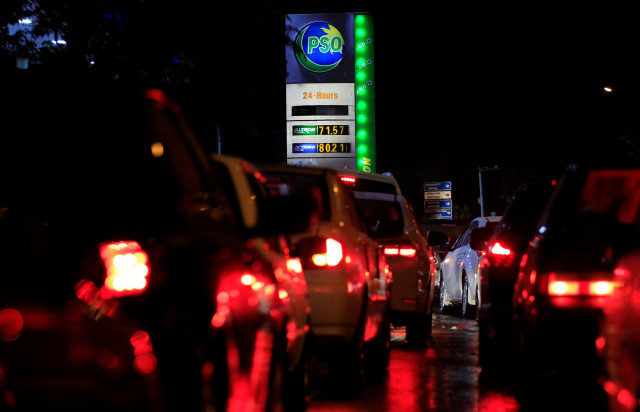PSO’s profit increases 15% to Rs5.02b during Jul-Sept
Increase in sales, higher other income lead to the surge

PHOTO: AFP
Notable drop in finance cost and effective tax rate also helped the bottom-line grow, according to a bourse filing on Monday.
The oil and gas marketing firm had booked a profit of Rs4.37 billion in the same quarter of the previous year.
Earnings per share (EPS) surged to Rs18.51 from Rs16.11, according to the company’s profit and loss accounts available at the Pakistan Stock Exchange (PSX). PSO’s share price inched down 0.14%, or Rs0.52, to Rs358.34 with a volume of 1.6 million shares.
PSO MD’s monthly salary comes under scrutiny
Net sales increased 34% to Rs258.64 billion from Rs193.50 billion in the corresponding period on the back of a combination of volumetric sales and price-hike of the products sold during the quarter (July-September 2017).
The increase in sales is seen “on account of 2% sales [volumetric] growth and 17% increase in oil prices,” Topline Securities said in a post-result comment. IGI Securities, giving a break-up of the volumetric sales product-wise, elaborated that petrol (motor gasoline) sales increased 29% and high speed diesel rose 32%.
Besides, sales of liquefied natural gas (LNG) and lubricant also improved.
Sale of furnace oil (FO), the single largest selling product at PSO, is believed to have slashed in the quarter.
Its price, however, hiked 20% and helped the firm earning improved profits.
The company’s income from other than the core business increased 16% to Rs2.21 billion from Rs1.90 billion after the maturity of Rs46-billion worth of Pakistan Investment Bonds (PIBs) in July 2017, with mark-up rate of 11.5%. “This led to higher than estimated earnings,” Topline said.
PSO’s receivables cross Rs300b, but govt to release only Rs10b
IGI added the surge is seen likely owing to late payment surcharge (LPS) income amid rising receivables. “To recall, the management stated that the company’s outstanding LPS amount accumulated due to non-payment from customers and it is likely the company recovered some of the outstanding amount during 1QFY18.”
Finance cost of the company dropped 41% to Rs756 million from 1.27 billion “likely on the back of reduced short-term borrowing as the company paid off its short-term debt through proceeds from maturity of PIBs in Jul-17,” it said. The effective tax rate stood at 32.2% during 1QFY18 compared to 35.5% in the same period last year.
Published in The Express Tribune, October 24th, 2017.
Like Business on Facebook, follow @TribuneBiz on Twitter to stay informed and join in the conversation.



















COMMENTS
Comments are moderated and generally will be posted if they are on-topic and not abusive.
For more information, please see our Comments FAQ